|
|
|
Sort Order |
|
|
|
Items / Page
|
|
|
|
|
|
|
| Srl | Item |
| 1 |
ID:
129967
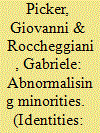

|
|
|
|
|
| Publication |
2014.
|
| Summary/Abstract |
This article expands the research on abnormalisation and the construction of social deviance of minorities. It focuses on the relationships between state practices, policies and expert knowledge addressing the Roma in Italy; it does so by first contextualising recent ethnographic findings on Turin authorities' social inclusion practices addressing Roma within the history of national and regional policies for Roma; it then contextualises those policies within the history of expert knowledge about Roma. Unlike what other studies on abnormalisation suggest, we argue that the abnormalisation of Roma in Italy is not primarily predicated upon the idea that they are at present unfit to follow the norms of the majority; rather, it stays upon a historically rooted representation of Roma oscillating between the poles of potential re-educability and potential dangerousness. In the conclusion we encourage further comparative research on abnormalisation, especially including practices and knowledge addressing other European minorities such as the Jews.
|
|
|
|
|
|
|
|
|
|
|
|
|
|
|
|
| 2 |
ID:
129978
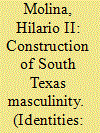

|
|
|
|
|
| Publication |
2014.
|
| Summary/Abstract |
I contend that masculinity formation in South Texas is linked to objects that have been deemed as 'manly'. This study is significant because it examines a group in the US population that, according to census predictions, account for a large percentage of the fastest growing and largest Latino group in the United States. This autoethnography research examines how pico de gallo - a type of salsa - and the barbeque grill assist working-class Mexican American males in constructing a masculine identity known as macho. The data are based on observing 30 social events in the Rio Grande Valley. The findings reveal a pursuit for an apex status of macho through these objects and the cultural transmission of gender roles to the next generation of males. This study concludes by offering suggestions in examining how masculinity, for men of colour, might be linked to marginalisation practices within a social structure.
|
|
|
|
|
|
|
|
|
|
|
|
|
|
|
|
| 3 |
ID:
129962
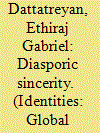

|
|
|
|
|
| Publication |
2014.
|
| Summary/Abstract |
This essay explores how my diasporic 'returnee' status positions me with the participants in my research endeavours within education reform non-governmental organisations (NGOs) in and around Bangalore, India. I argue that in addition to forcing me to reassess the scripts of 'belonging' I hold as an Indian American, the very stories that make me part of the diaspora reshape the research context by offering my interlocutors new narrative tropes by which to (re)imagine India. These re-imaginings precipitate a destabilisation of context-specific categories that limit social interaction, such as caste, class, gender and regional belonging, allowing me the possibility of ethnographically sincere encounters across a diverse set of participants. However, as I persistently transgress boundaries I find myself in vulnerable positions, as the politics of difference within the organisation threaten to undermine my research endeavour.
|
|
|
|
|
|
|
|
|
|
|
|
|
|
|
|
| 4 |
ID:
129965
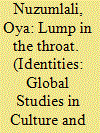

|
|
|
|
|
| Publication |
2014.
|
| Summary/Abstract |
The unprecedented election of a Süryani-Keldani, a member of a minority Christian community, to the parliament of Turkey, elicited responses from the community that embodied conflicting dispositions as to what a Süryani-Keldani identity entails. This article defines intimate communities and elaborates on the concept of model minority as it pertains to this particular group, and in doing so, offers a criticism of multiculturalism's tendency to essentialise ethnic groups through affect theories.
|
|
|
|
|
|
|
|
|
|
|
|
|
|
|
|
| 5 |
ID:
129977
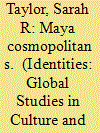

|
|
|
|
|
| Publication |
2014.
|
| Summary/Abstract |
Maya heritage is embraced throughout Yucatán as a crucial component of tourism promotions. This, coupled with an emphasis on multiculturalism, makes the state itself a local actor in the marketing of Maya identity through the creation and funding of community-based tourism projects. This article discusses the shifting role of the state in shaping these communities, referencing a Maya village in the Mexican state of Yucatán as the context. The aim is an understanding of the articulation of local tactics to conceal cosmopolitanism while remaining competent in the eyes of funding agencies and the strategies employed by the state that reinforce the importance of performance for tourists. The desire on the part of state creates situations in which individuals are expected to exist in concurrent states of authenticity and modernity, as both traditional and cosmopolitan.
|
|
|
|
|
|
|
|
|
|
|
|
|
|
|
|
| 6 |
ID:
129961
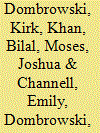

|
|
|
|
|
| Publication |
2014.
|
| Summary/Abstract |
This paper describes results from a network survey of Nain - a predominantly Inuit community of ~1200 people located on the northern coast of Labrador. As part of a larger social network research project, we used peer-referral sampling to recruit 330 residents for interviews about food sharing, housing, public health and community traditions. The peer-referral chains were analysed statistically to determine the presence and absence of social divisions in the community. The results of these analyses show that ethnic identification, relocation status and household income were the most significant social divisions in the community, while gender, education level and employment status show little or no effect on patterns of between-group interconnection. We argue that statistical patterns in the presence (and absence) of intergroup links offer novel ways to examine the interrelationship between recent economic development and the historical disruptions caused by Inuit community relocations in the 1950s.
|
|
|
|
|
|
|
|
|
|
|
|
|
|
|
|
| 7 |
ID:
129970
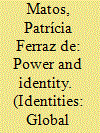

|
|
|
|
|
| Publication |
2014.
|
| Summary/Abstract |
This article reflects on the inclusion of human beings in the colonial representations of the great exhibitions that Portugal organised or took part in during the first half of the twentieth century. It analyses the role played by the natives (from the Portuguese colonies), as well as the way they were represented and treated, based on various documents and interviews and on the study of the exhibition creation process. These exhibitions revealed some underlying tensions. On the one hand, they provided evidence of the differences between the 'civilised' and the 'uncivilised', of the diversity of 'races' and of their places in a hierarchy of civilisation. On the other, they extolled the way colonised peoples adopted Portuguese models. The ways those human beings have asserted their existence, under the power of the exhibition's organisers, provides a means to understand how they forged and assumed their identities in a context of rules.
|
|
|
|
|
|
|
|
|
|
|
|
|
|
|
|
| 8 |
ID:
129960


|
|
|
|
|
| Publication |
2014.
|
| Summary/Abstract |
Scholars know far less about 'national identity' than 'nations' and 'nationalism'. The authors argue that the concept is sociologically important and briefly discuss its relationship with language. They examine empirically how people living in the Gàidhealtachd, the area of Scotland associated with Gaelic language and culture, whether they are Gaelic speakers or not, whether incomers or not, go about their territorial identity business. The article shows how respondents' Gaelic identity relates to their British and Scottish identity; how people living in the Gàidhealtachd assess putative claims to a Gaelic identity based variously on language, residence and ancestry; and how they see the balance between 'cultural' and 'political' elements in Gaelic. The authors argue that to study 'what makes a Gael?' highlights the key role territorial identity plays in connecting social structure to social action, and also that identity provides a set of meanings and understandings through which people experience social structure and feel empowered to act.
|
|
|
|
|
|
|
|
|
|
|
|
|
|
|
|
|
|
|
|
|